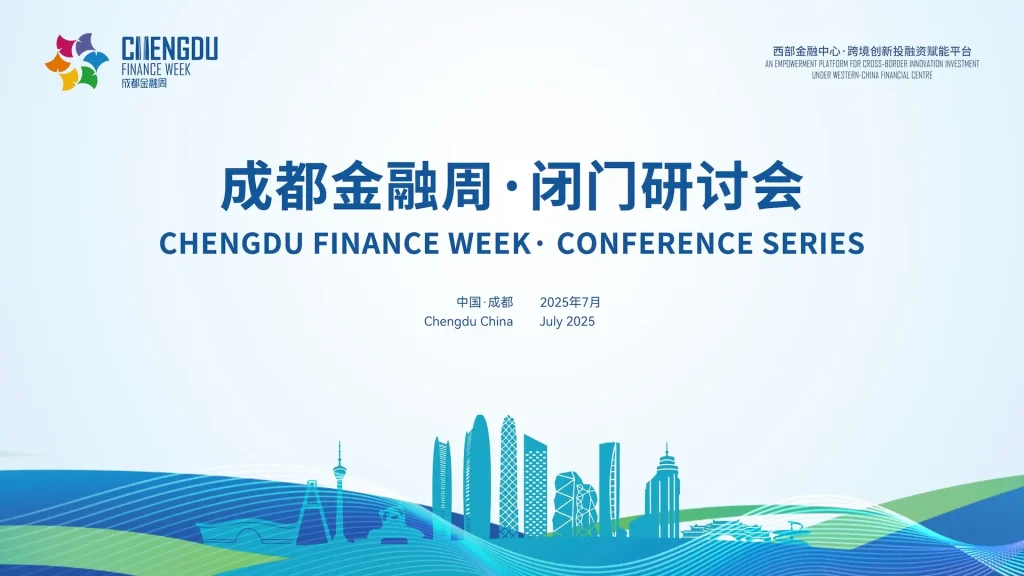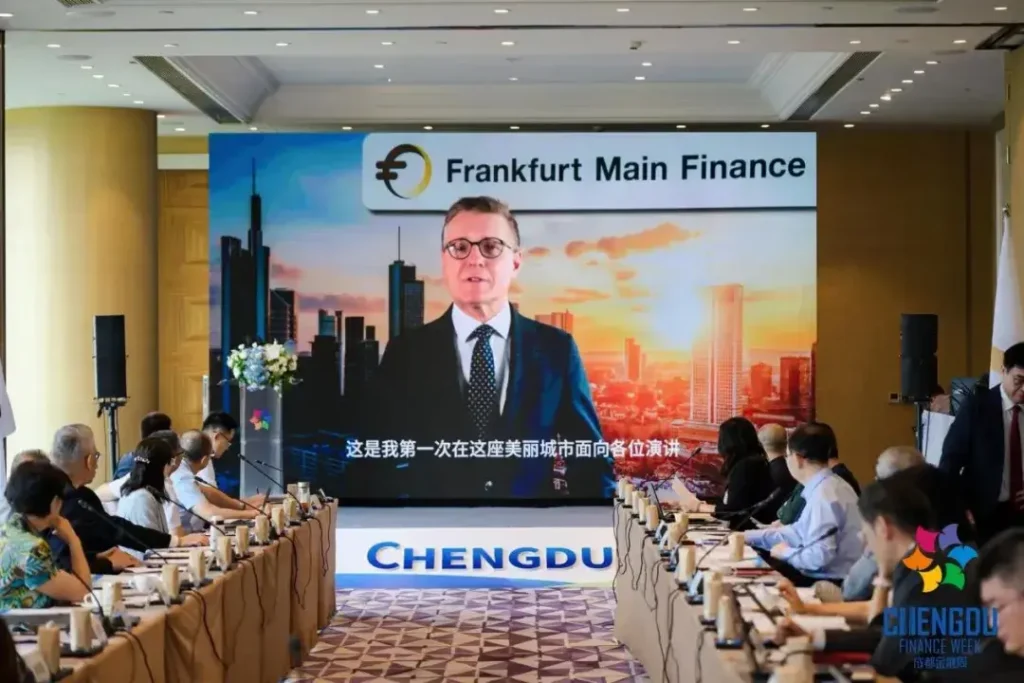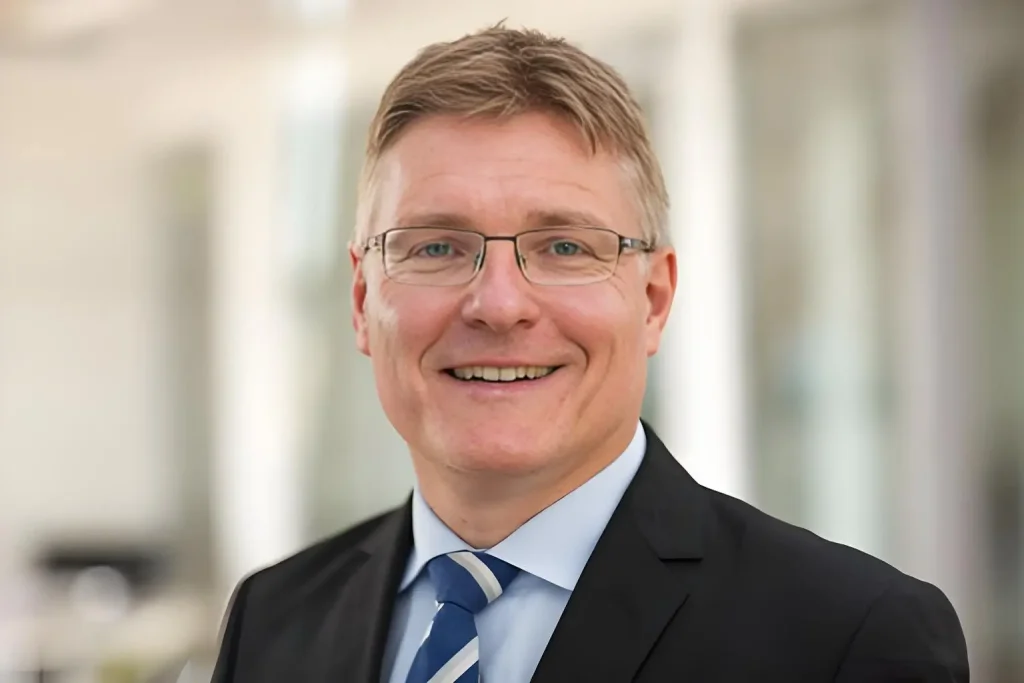On July 10, 2025, the “Chengdu Finance Week · Conference Series” was successfully held, hosted by the China Innovation Finance Institute | Chengdu and jointly guided by leading national think tanks and associations, including the China Society of World Economics, China International Finance Society, China Association for the Promotion of Development Financing, Chinese Association of Middle East Studies, and China Reform Forum.
The seminar focused on two major themes: “China’s Global Economic and Financial Cooperation under Geopolitical Changes” and “the Middle East-Gulf Innovation Investment Opportunity, Challenge and Strategy” It offered in-depth discussions on the opportunities and challenges facing China’s outbound investment and financing in the context of an evolving global economic landscape.
Bringing together influential experts from the fields of finance, investment, and policy, the seminar aimed to discuss international cooperation paths for China’s financial liberalization and the synergistic development of the western region.
Below is the keynote speech delivered by Mr. Hubertus Väth, Managing Director of Frankfurt Main Finance (FMF).


Nihao (hello), a very good morning. Ladies and gentlemen, it’s both an honor and the privilege to speak to you at the Chengdu Finance Week 2025. This is the first time I’m addressing an audience in your beautiful city. And also, I’ve never walked its streets. I have tasted its famous cuisine on many occasions, and I liked its distinct taste very much.
People say, Chengdu moves at his own pace, confident, rooted in history and yet open to the future. That, in many ways reminds me of my hometown, Frankfurt. I was asked to talk today about building up trust in finance. This doesn’t work overnight. It works through consistency, patience and quiet strikes. Easier said than done. History has much to teach us about how to build trust through time.
The story of Frankfurt as a financial hub began in 1585. During the bustling days of the Frankfurt Autumn Fair, merchants from across Europe gathered into city and 84 of them agreed upon standardized exchange rates for different currencies. It was a bold move then towards economic order, and it marked the founding of what is still known as the Frankfurt Stock Exchange. This act of standardization was a milestone in building trust as it created a reliable framework for trade. Merchants met regularly, establishing trust and the city’s reputation crew. It wasn’t long before international traders flocked to Frankfurt, recognizing its important as a hub for European commerce.
Moving forward in history to 1811 marked a profound moment for Frankfurt’s commitment to Equality and economic inclusion. Jewish citizens of Frankfurt adrift legal Equality, granting them access to emic activities that were previously restricted. This historical step opened the door for Jewish entrepreneurs to thrive, enriching the financial sector. Among them were the Rothschild family, which became a pillar of the financial global network.
The journey of trust was disrupted during World War 2, but soon recovered in 1948 with the currency reform that introduced the Deutscher Mark. This new currency brought stability to a war-torn economy, symbolizing hope and recovery. Nine years later, in 1957, the establishment of the Bundesbank in Frankfurt solidify the reputation for monetary stability. The Bundesbank operated independently of political influence, which further strengthen trust in its policies and hence the currency. The Deutsche Mark became synonymous with economic growth and Frankfurt’s role as a financial center was cemented in European and global markets.
The launch of the European Central Bank, ECB, in 1998 in the mouth of Bundesbank. With another milestone, Frankfurt became the capital of European monetary policy. Financial institutions move their operations to Frankfurt to be closer to the heart of decision making, and the city gained prominence as a trusted financial hub. It wasn’t just about capital inflows, it was about political and media attention as well. Frankfurt is now recognized as the capital of the euro, the world’s second most important currency.
In the year 2000, the creation of Clearstream International marked another leap forward. The merger of Deutsche Börse Clearing led to a more efficient securities transaction and position Frankfurt even more firmly as a global financial player. The innovation continued in 2,001 with the foundation of Eurex Repo, which introduced electronic trading for repos and securities lending. This move brought greater transparency and liquidity to the market, reducing risks through standardized processes, and it was a glimpse into the future of finance where technology and trust would go hand in hand. In 2,003, Frankfurt took another pioneering step by introducing a central counterparty in equities trading. This innovation minimized risks between trading partners and accelerated settlement processes, the seamless transaction and enhanced market confidence were evidence of how trust, combined with innovation, could elevate financial stability.
2012 then marked a defining moment for Frankfurt’s reputation on the global stage. During the height of what is known as a euro crisis, Mario Tragi, the then President of the ECB, famously declared, we will do whatever it takes to preserve the euro. This powerful statement resonated globally and became the embodiment of trust and resilience. Global markets responded with confidence, civil and risk premium fell and the euro stabilized. Today, sovereign credit specs in Europe are at its narrowest in the aftermath of the Brexit referendum in 2016.
The financial world witnessed as a result, a significant shift. The UK left the Common Market, a shock for trust in the political system of our neighbor. As a result, about 60 international banks began moving parts of their operations from London to Frankfurt, seeking secure access to the European Single Market. We saw a shift of over 2,500 billion dollar in banking assets.
Brexit eroded trust. Frankfurt gained trust because we gave a hand. Institutions like Citibank, Nomura, JP Morgan, Goldman Sachs, Morgan Stanley, applied for extended banking licenses in Frankfurt, leading to the direct creation of over 9,000 jobs and many more in supporting roles. The multiplier of a job in financial services is amongst the highest across industries at over seven. A surge in office space demand followed, 20 new skyscrapers reshaped our skyline, solidifying trust in its strengths and attractiveness.
Trust, ladies and gentlemen, is a cornerstone of thriving financial markets. It’s an invisible hand that binds transaction, sustains investments and drives global growth. But trust is not granted freely. It is first and foremost. And once earned, it must be nurtured. How do we gain it? We gain trust by responding to market needs swiftly and effectively. By building it, by being open, not just open to capital and innovation, but to new ideas, diverse actors from around the globe. And finally, we secure it through standardization and digitalization, setting clear rules and leveraging technology to make markets more transparent and efficient.
Frankfurt’s commitment to standardize process, digital securities and seamless cross-border transaction has positioned it as a pillar of trust in European and global markets. And how one might eventually lose it? The history of financial market shows us that trust can be shattered.
In a few precious moments, the recent tariff shock Cold Liberation Day serves as a stark reminder. This single event sent ripples across global capital flows, destabilizing investment plans and shaking market confidence. A lack of predictability and transparency erodes trust, driving investors to seek more stable grants. The dollar lost straight weighted over 10%. Capital moved from the US to Europe and foremost Germany and its financial center, Frankfurt. Today, we get daily calls in Frankfurt from investors around the world exploring options for shifting assets our way. As we look ahead, let us remember the trust in finance is a competitive advantage. Frankfurt and Chengdu with a growing financial corporations, have the unique opportunity to set a global standard for trusted financial markets. Together, we can build a bridge that not only connects east and west, China and Germany, but strengthens the very fabric of global finance.
In conclusion, trust is a result of consistency, openness and resilience. Frankfurt’s financial history is a testament to this and it‘s becoming for what is possible when trust is placed at the heart of financial innovation. As Chengdu looks to its future, I’m confident that the path of building trust and open collaboration will be key to your success. You already gained a lot of trust, not least ours, deservedly so. Thank you, and I wish this event a great success. Xiexie (Thank you).

Managing Director of Frankfurt Main Finance (FMF)
Disclaimer: This article is compiled from the keynote speech delivered by Mr. Hubertus Väth at the 2nd Chengdu Finance Week. The opinions expressed by authors do not necessarily reflect the views of the China Innovation Finance Institute.

